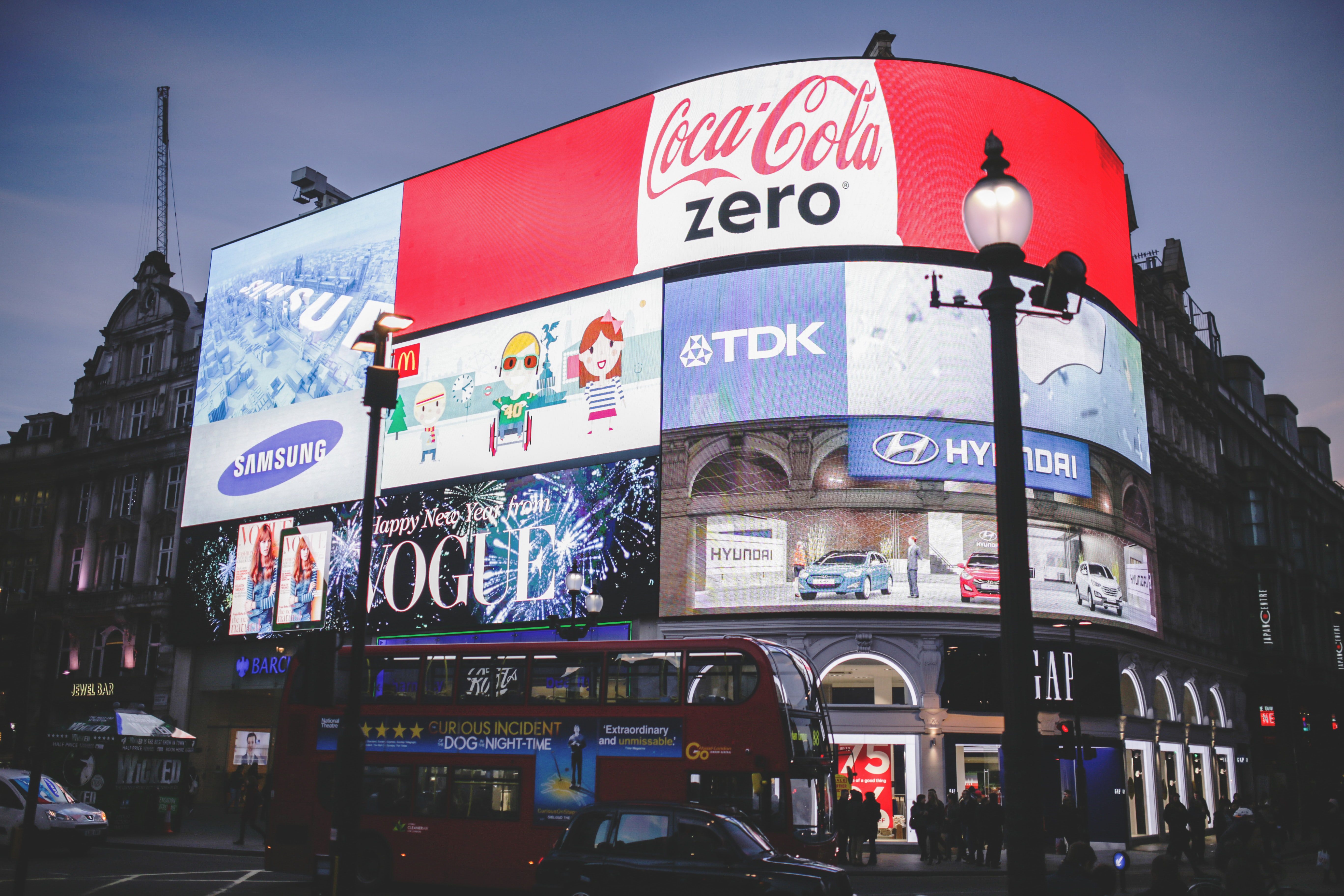In London at the start of the year, perhaps there was more advertising than there usually is in my life, because I found its presence disgusting and upsetting. Could I not use public transport without having my mind intruded upon continually by trite performative questions?

Sometimes I fantasize about a future where stealing someone’s attention to suggest for the fourteenth time that they watch your awful-looking play is rightly looked upon as akin to picking their pocket.
Stepping back, advertising is widely found to be a distasteful activity. But I think it is helpful to distinguish the different unpleasant flavors potentially involved (and often not involved—there is good advertising):
1. Mind manipulation: Advertising is famous for uncooperatively manipulating people’s beliefs and values in whatever way makes them more likely to pay money somehow. For instance, deceptively encouraging the belief that everyone uses a certain product, or trying to spark unwanted wants.

2. Zero-sumness: To the extent advertising is aimed at raising the name recognition and thus market share of one product over its similar rivals, it is zero or negative sum: burning effort on both sides and the attention of the customer for no overall value.


3. Theft of a precious thing: Attention is arguably one of the best things you have, and its protection arguably worthy of great effort. In cases where it is vulnerable—for instance because you are outside and so do not personally control everything you might look at or hear—advertising is the shameless snatching of it. This might be naively done, in the same way that a person may naively steal silverware assuming that it is theirs to take because nothing is stopping them.

4. Cultural poison: Culture and the common consciousness are an organic dance of the multitude of voices and experiences in society. In the name of advertising, huge amounts of effort and money flow into amplifying fake voices, designed to warp perceptions–and therefore the shared world–to ready them for exploitation. Advertising can be a large fraction of the voices a person hears. It can draw social creatures into its thin world. And in this way, it goes beyond manipulating the minds of those who listen to it. Through those minds it can warp the whole shared world, even for those who don’t listen firsthand. Advertising shifts your conception of what you can do, and what other people are doing, and what you should pay attention to. It presents role models, designed entirely for someone else’s profit. It saturates the central gathering places with inanity, as long as that might sell something.

5. Market failure: Ideally, whoever my attention is worth most to would get it, regardless of whether it was initially stolen. For instance, if I have better uses for my attention than advertising, hopefully I will pay more to have it back than the advertiser expects to make by advertising to me. So we will be able to make a trade, and I’ll get my attention back. In practice this is probably too complicated, since so many tiny transactions are needed. E.g. the best message for me to see, if I have to see a message, when sitting on a train, is probably something fairly different from what I do see. It is also probably worth me paying a small sum to each person who would advertise at me to just see a blank wall instead. But it is hard for them to collect that money from each person. And in cases where the advertiser was just a random attention thief and didn’t have some special right to my attention, if I were to pay one to leave me alone, another one might immediately replace them.1

6. Ugliness: At the object level, advertising is often clearly detracting from the beauty of a place.

These aren’t necessarily distinct—to the extent ugliness is bad, say, one might expect that it is related to some market failure. But they are different reasons for disliking a thing-a person can hate something ugly while having no strong view on the perfection of ideal markets.
What would good and ethical advertising look like? Maybe I decide that I want to be advertised to now, and go to my preferred advertising venue. I see a series of beautiful messages about things that are actively helpful for me to know. I can downvote ads if I don’t like the picture of the world that they are feeding into my brain, or the apparent uncooperativeness of their message. I leave advertising time feeling inspired and happy.

One particularly important market failure in practice might be the lack of awareness by publishers about the loss from advertising; anyone can calculate the immediate revenue from carrying advertising, but the loss in readership is far harder to measure, creating a strong bias toward carrying too much advertising. It’s rarely measured, but does seem to be large enough that for many publishers, it would substantially decrease the estimated profit, or even turn it into a loss. (I am pretty sure the latter was the case for me.) Across an entire society, that might translate to quite a lot of deadweight losses due to excess ads.
I want to push back a little on this point. In this scenario, the advertisement does actually provide a useful costly signal to the consumer: it makes sense for a firm to buy advertising when they expect that it will induce enough sales to earn back the initial cost in profits. Inversewise, when a firm is not confident enough in their product, they will not buy advertising. While there may be different factors that go into this, a large part of that is whether or not other existing / potential customers have a positive opinion of the brand, which is generally correlated with the quality (per price) of the brand’s product. This means that if I see substantially more advertising for Brand X than for superficially-similar Brand Q, I can reasonably assume that Brand X is likely to have a better product than Brand Q.
This effect creates value for both me and the superior brand, even in a situation that seems superficially zero-sum. Of course, if the two products are literally identical, then this is irrelevant. But most products you see advertised are not perfectly identical to their competition. There are also other factors, such that companies with more pre-existing resources can buy more advertising than a less-resourced company—but even then, if the underdog’s product is good enough, their investments in advertisements will have a better payoff, allowing them to bootstrap to the point where they can afford a similar amount of advertising.
I have the opposite reaction. Example: two products sell for the same price, Brand X spends 50% on manufacturing the product and 50% on advertising, Brand Q spends 80% on the product and 20% on advertising. If I buy Brand Q, I am getting more product and less advertising.
Another example: Diet Coke is twice as expensive as Sam’s Diet Cola (Walmart’s house brand). Let’s see, flavored caffeine water plus advertising, or flavored caffeine water without advertising? Which is the better deal?
I see advertising as a negative signal.
Elon Musk is confident enough that he can sell all the Tesla’s he produces without buying advertising. On the other hand there are car companies who don’t believe that they can sell as much cars as they produce without advertising and thus buy advertising. Confidence in a product being able to succeed without advertising seem to me a good signal for product quality in the case of Tesla.
I think Scott Alexander’s Why Real Men Wear Pink provides a useful lens here. Indeed, in the case of Tesla, you are correct that Tesla sends a signal by not advertising—they know they can sell cars without doing any advertising, because they know you know that their product is just that good—and when you see they don’t advertise, you know that they know that you know their product is just that good.
But consider the case of just about any other mainstream car company today (well, aside from Ferrari and Porsche, maybe a few others)- their product may be great, or it might be below par, but either way, they can’t be sure that you know that. The below par company might be able to sell a few cars through advertising, but buying a new car is a big enough deal for most consumers, that they will do their research before buying the car, and will know to avoid the subpar brand, so even with a lot of advertising, they won’t earn back what they spend. On the other hand the company with a very solid product, but who doesn’t have Tesla’s reputation, will find that their profits will be very closely proportional to how much they advertise, and so will advertise as much as they can.
In short: S-tier: Tesla: No advertising
A-tier: Solid car company: A lot of advertising
C-tier: Subpar car company: Minimal advertising
Neither the S-tier nor the C-tier does heavy advertising, but the important thing is, you already know who’s S-tier and who isn’t. When a company isn’t S-tier, a lack of advertising can be interpretted as a lack of confidence in the product
I’m not sure what “as much as they can” means. A company can choose to spend more or less on advertising. They can spend less on product quality and take that money to spent on advertising
Cars are not either solid or subpar but they provide value for a given price.
Company A might say: Our strategy is to run a lot of advertising and then charge a lot of money for our cars to make a huge profit.
Company B might say: Our strategy is to provide customers with a cheap car and that means we won’t have a budget for a lot of advertising.
In many cases it can make sense to buy from company B and get a car that’s better value for money. Cars are however a special case. Value conscious car buyers don’t buy new cars but used cars
The fact that Coca Cola spends so much money on advertising doesn’t indicate that their product is better then any other. It just reflect that they believe that they have a brand that allows them to charge a surplus.
This is a bizarre example, sort of like using Bill Gates to show why nobody needs to work for a living. It ignores the extreme inequality of fame.
Tesla doesn’t need advertising because they get huge amounts of free publicity already, partly due to having interesting, newsworthy products, partly due to having a compelling story, and partly due to publicity stunts.
However, this free publicity is mostly unavailable for products that are merely useful without being newsworthy. There are millions of products like this. An exciting product might not need advertising but exciting isn’t the same as useful.
So It seems like the confidence to advertise a boring product might be a signal of sorts? However, given that many people in business are often unreasonably optimistic, it doesn’t seem like a particularly strong one. Faking confidence happens quite a lot.
There are many reasons why a customer might buy a product. I might buy one kind of product because it’s cheaper then the next. I might buy one kind of product because of publicity stunts. I might buy a product because a friend recommended it to me because they had great experiences with it. I might by a product because it has good reviews. I might buy a product because it has good advertising.
On the other side an executive is thinking “What’s my core strategy for aquiring customers?” If the core strategy is advertising and not producing products with good value propositions, that’s to me a bad signal.
80⁄20 thinking does mean that many times there’s a core strategy on which a company focuses.
It bothers me on a fundamental level that we’ve been conditioned to accept ads as “the price of the internet”: I want to pay $5 for an app with no ads/IAP, not be advertised to forever. I want to pay $5 a month to listen to a podcast without ads, not have my precious time taken up with podcast hosts (aka People I Trust) telling me about how much they love whichever meal box kit is paying them this year.
I put my money where my mouth is, btw: I support ad-free podcasts, or podcasts with unlockable ad-free versions, on Patreon (as ad-free is becoming a more common perk, it’s beginning to get expensive, but podcast-listening is my main hobby). I messaged one small podcaster about why she didn’t have ad-free versions of her podcast as a patreon perk and she said the reason for it was because her advertisers have a clause stating that there must be no ad-free versions, because apparently the more devoted listeners (the ones who trust the podcasters the most) are their preferred target market.
I also emailed a podcaster I listen to when her podcast ran an ad for a ‘product’ I knew she wouldn’t support if she knew some easily googleable backstory, and she emailed me back, pulled the ad, and said that she hadn’t used the product and so didn’t know that the product was counteractive to her ‘brand’. Obviously, you know a lot of these endorsements are fake, but I find podcasts especially insidious as the podcaster-listener relationship is surprisingly intimate.
So yeah, I completely agree with you. I’m voting with my dollar, to try and make the “paid” business model more sustainable for internet services. Thanks for an enlightening post!
I’m curious if there is any reason we should expect paying for ad-free media and software to ultimately go any better than cable TV did. Being ad-free was one of the original promises of paying for a TV subscription in the first place, and now we ended up with both ads and subscription fees in ever-increasing amounts. Well, up until the point that many of us are cutting cable and getting everything online. Right now there’s a lot of competition among streaming providers targeting different parts of the spectra for media access, payment, and advertising exposure, but I suspect it’s partly a matter of the Powers That Be not yet having found strategies to lock up the market in some way.
I don’t think “ultimately” has any place in this conversation. We’re nowhere near the ultimate, and won’t be for a long time. This is likely to be a cyclic equilibrium, where it swings between more reasonable and less. It happened for TV disaggregation—the power of TiVo to skip ads varied over time as ad-injection tech changed, then paying for ad-free, then paying more for ad-free, then some services that don’t have an ad-free tier. It’s happening on the web and in apps—many have an ad-free tier if you pay, and there are ad-blockers with varying degrees of effectiveness. And counter-technology to detect the ad-blockers, in an interesting but non-static arms race.
I think it won’t be long (under a decade) before wearable ad-blockers are available for the rich. And then ads will start incorporating detection-blockers, and the ad-blockers will start selling replacement ad space, and then something else will change.
People’s attention and beliefs are far too valuable to let them keep.
To be honest, I don’t care how things will go in the future: at the moment, I’m paying, now, to not experience ads, and I’m hoping that my purchasing decisions in this vein will encourage the sort of behaviour I want. If hosts start incorporating ads into their patron podcasts they’ll lose my $5/mo and receive a polite but firm note explaining why.
I think of ads like a jungle.
The jungle is full of beautiful things, which are optimized to extract value from me. Some of them just want me to carry their pollen; others want to paralyze and eat me. None of them care much for what I want; the jungle was produced by eons of violent battle for survival, and every single piece of it is ruthlessly optimized for something orthogonal to human values. And yet, the outputs of that violent battle—the trees, the flowers, the birds—are beautiful.
As with a jungle, it’s not an aesthetic which appeals to everyone. But it feels weird to me to call ads “bad”, in much the same way that it feels weird to call a jungle “bad”.
Interesting comparison!
I intended to write something like the following as a new comment, but you provided a great metaphor:
One aspect that I want to point to is that the jungle can be ‘out to get you’:
As ads become the norm in public spaces—which comprise a large part of the interaction between an individual and “society at large”—this will affect the trust-level of the people involved. A consequence of this would be that bad and manipulative ads provide a limit on how much individuals can trust that their society is friendly to them and whether behaving cooperatively is viable.
Regarding the badness of ads, I think that a lot of it hinges on how well or badly their goals actually are aligned with the customers. Currently there are also many positive or neutral ads, but I wouldn’t be surprised if the large effort being put into worldview-distortion already has significant negative side-effects.
To come back to the jungle metaphor: Probably the jungle does serve an important purpose, and can even be a place of beauty. But for this it should be a jungle with threats that most of us can manage with a bit of experience. Or at least a place that we can escape from into safety. If it is an unavoidable place full of unknown danger and parasites altering my mind, it is not beautiful any more.
Advertising you want to look at is called “news”, “media” or “product placement”.
There’s a game of chicken in “who has to connect potential buyers to sellers, the buyers or the sellers?” and depending on who’s paying to make the transaction happen, we call it “advertisement” or “consultancy”.
(You might say “no, that distinction comes from the signal-to-noise ratio”, so question: if increasing that ratio is what works, how come advertisements are so rarely informative?)
Mod note: the first image in the post was 27000px wide, making it over 10MB large. I reduced it’s size to safe the poor data plans of our mobile connections and to make the post (and the frontpage) load a bit faster.
Given that the second image is with 17.581,14 KB also >10MB only doing that for the first image seems inconsistent. Maybe there’s a general plugin that manages images that takes care of such issues?
The first one was really important because it was shipped with every frontpage load, so I didn’t notice the second one.
We already compress images if you upload them to LW, but this post was cross posted, where we just take the HTML and copy it over, and we don’t have any fancy infrastructure set up to reupload and resize the images for that use case.
Ok, I now updated all the images in the post to be properly resized.
I like to think of advertising as commercial propaganda. That is technically what it is. Whereas political propaganda’s purpose may be to influence people to support a political belief, commercial propaganda is to influence people to support a commercial enterprise.
People tend to think of political propaganda as something from World War 2 and authoritarian regimes. But it was used in the West and it never went away. It just became more sophisticated over time and a part of that was re-branding it to “spin” or “public relations”. The original word is useful because it is accurate and it highlights the obvious negative consequences of the practice.
I would encourage Katja to try to flip some of these negatives of advertising on their head. After all, the growth of advertising is directly related to the greatest of human prosperity ever. The two are connected. For me, personally, the farthest I have ever been from public, corporate advertising was when I toured Havana, Cuba.
Do you consider this connection to be correlation or causation?
Haha, it is definitely both. There’s nothing to advertise! But there’s nothing to advertise because the activities that benefit from advertising are illegal!
Ah, I was looking at your comment in the other direction, do ads cause prosperity or are ads correlated with prosperity (and having a hard time forming a model that ads cause prosperity while not finding ads being correlated with prosperity significant, really). But I guess you were saying more that ads are a sign of prosperity and so even if they’re annoying it’s better than living somewhere that isn’t prosperous enough for ads?
Yeah, that’s exactly what I’m saying. Ads are, at the very most basic, just broadcasts of information with the intention of changing some behavior. Prosperity requires different actors in the economy to do what is most efficient, but often it isn’t efficient for actors to actually go and track down their own suppliers. Instead, suppliers go and track down their buyers by broadcasting ads.
The Internet has certainly changed that: my search history and browsing history effectively broadcast to suppliers, “I need a new car”, and then the algorithms present me with information concerning that need (ads on instagram for Jeeps). Yet, the vast majority of people live in a pre-Internet situation for their most basic needs, where broadcasting from the supplier is still important.
Without this mechanism of “supplier broadcast”, a lot of buyers would simply not be able to meet their needs because they don’t have the bandwidth to go and fulfill their needs. The problem that Katja really should be getting at is when the supplier broadcast goes wrong- generating need when there isn’t any, or broadcasting so much that it swamps out more important signals, etc.
I want to raise that I am rarely in the London Underground, and when I am I do find the ads kind of fantastical and exciting. Of course, perhaps I’m buying into a fraud.
I do think that architecture and design of major city centers has the potential to be a lot more unique if they don’t have to be just loads of massive screens.
From a tort standpoint, I think you’d have to show breach of duty, and from a contract standpoint (even a theoretical one) a failure to comply. In either theory, what caused the duty to give you a pleasant view or experience to exist for the advertiser or owner of a space? From a more utilitarian standpoint, how do you measure the costs (and benefits, where they exist) to viewers in order to compare to the benefits to the advertisers and space-owners?
Is there a significant difference between advertising, and ugly/offensive public art? Seems like the objections apply to both, but the advertising at least brings revenue to the space owner (possibly offsetting cost to consumer/taxpayer), where the “art” is pure expense.
Epistemic status: throwing ideas
Ads exist because people aren’t aware of all the products that exist. At its best, an ad manages to link a product with a client who needs it. Ethics in advertising should focus on maximising the chances of that, while minimizing side effects.
To me, the most obvious way to get that is that advertisings only assert and imply true things. As a bonus, they would avoid shocking the receiver needlessly, or uglifying their spot too much.
On a system level, the medium displaying ads would rate their quality (based on the aforementioned criteria and others), and the duration an ad is displayed would be commensurate with its rating.
I also hate ads, but to play devil’s advocate:
It works as a sort of “progressive tax”. Everyone pays the same amount of “stolen” attention for “free” internet, regardless of how much money they have. And wealthy people lose more potential earnings for the same fixed amount of time lost to the ad.
It serves as an inoculation for more nefarious forms of manipulation. In advertising, everyone gets a chance to see what manipulation looks like when the manipulator’s motivations are relatively obvious. So when some troll tries to convince you of a conspiracy, or pull you into a pyramid scheme, you might be a little more skeptical of it. …maybe.
And now to play double devil’s advocate:
To get the “progressive tax”, I’d prefer to pay real money than have the oppressive shroud of advertising over everything. Also, people aren’t paying the “same amount of attention”. It’s the easily manipulable people who are giving the rest of us a free ride. So in that sense, it’s more like a regressive tax on the gullible.
I’m not sure how well ads actually work as inoculation. It’s a nice thought, but it also could be that it normalizes that sort of manipulation. People primed by advertising may actually be more vulnerable to other manipulations.
I don’t think we can do much to change the culture of advertising until we give people the tools to defend against it. And a nice side benefit is we’d also be giving them the tools to defend against more nefarious manipulations.
One or more of the images in this post is causing my browser (chrome on android) to crash with a “could not load the page” error. The page loads fine until I scroll down to just below the “theft of a precious thing” section. If I scroll past that section quickly enough that it doesn’t try to load the images there, then I can reach the comments without crashing.
Yeah, some of the images are really really massive. I will reupload some more of them with smaller resolutions.
I’ve had the same thought. Does the advertising market satisfy good goals? Probably not. What do you think the goals of the market should be?
It bears noting that ads can do good—they can spread important messages. They can encourage people to make purchases that they actually benefit from. And they can help especially with launching new projects that people aren’t yet aware of.
So ideally the advertiser would pay a price for inflicting these negatives, so that we would get the benefits with fewer of the costs.
This metaphor doesn’t work, unfortunately. You have huge ability to avoid advertising. Don’t go on the internet or watch TV. Turn your eyes away from billboards.
Advertising is an annoyance, closer to noise than theft. It is extremely annoying. Like noise, it may have very bad effects on us. Perhaps that’s an argument for regulating it somewhat more tightly: laws against advertising in public places seem reasonable to me, which is what most of your pictures focus on.
I like the idea of it being closer to noise, but there are also reasons to consider the act of advertising theft, or worse:
It feels like the integrity of my will is attacked, when ads work and I know somewhere that I don’t want it to; a divide and conquer attack on my brain, Moloch in my head.
If they get the most out of marketing it to parts of my brain rather than to me as a whole, there is optimization pressure to keep my brain divided, to lower the sanity waterline.
Whenever I’m told to “turn off adblocker”, for that to work for them, it’s premised on me being unable to have an adblocker inside my brain, preying on what’s uncontrollably automatic for me. As if to say: “we both know how this works”. It makes me think of an abuser saying to their victim: “go fetch my belt”.
Life is full of pressures, it’s true. Not just from deliberate advertising, but from social comparisons.
Unfortunately, it seems to me that it’s ultimately our responsibility to engage or not. If a website demands you turn off adblocker to read, you can always click away.
If you literally feel like ads are driving you insane, equivalent to being beaten with a belt every time you glance at a billboard, or compromising your very ability to make meaningful choices...
Well, that is probably a stronger visceral reaction than most people have to ads.
I for one often choose to get free content in exchange for trying to ignore ads. I feel this deal is worthwhile to me sometimes, other times not. I pay for a subscription to Spotify so that my music listening can go uninterrupted by ads. I don’t pay for a subscription to news sites that I can read if I turn off my ad blocker.
You are mostly right, but also ads pay for a lot of things: for example, for most of the Internet. Of course you might prefer to be able to pay for the same services in other ways. But, there are people who can’t afford to pay. They are probably not the intended target audience of the ads, but they get free things nevertheless. So, to some extent, ads extract value from negative sum contests between corporations and give it to the public, which might be regarded as beneficial.